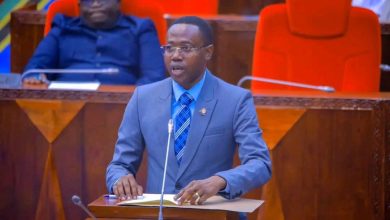Agric reforms backs Vision 2050 goals

DAR ES SALAAM: DEPUTY Permanent Secretary in the Ministry of Agriculture, Dr Stephen Nindi, has reaffirmed the government’s commitment to ensuring that agricultural transformation aligns with the country’s broader development goals, particularly those outlined in the long-term Tanzania Development Vision 2050.
Dr Nindi made the commitment during the high-level Food Systems Stakeholder Workshop held recently in Dar es Salaam.
He said agriculture had remained central to the country’s socio-economic transformation.
“We recognise that transforming our food systems is not just about increasing productivity but about ensuring inclusivity, nutrition and sustainability.
This transformation must be integrated into our national development goals to achieve prosperity for all,” he said.
The deputy PS added, “In order for us to truly achieve inclusive growth, we must align our agricultural strategies with nutrition, climate resilience and economic empowerment.”
He said the ministry was committed to working closely with partners, including UN agencies and local stakeholders to ensure that farmers, especially smallholders, are not left behind in the transformation journey.
He emphasised that the workshop reflects the government’s push to integrate evidence-based planning with community-driven solutions, particularly in the face of postdiscovery opportunities across various sectors.
The workshop, hosted by the United Nations in Tanzania under its Joint Programme on Food Systems Transformation, brought together a diverse range of participants including representatives from government ministries, development partners, civil society, academia, youth networks, the private sector and organisations representing people with disabilities.
It provided a critical platform to review progress on the Food Systems Transformation Roadmap (2021–2025) and Tanzania’s commitments under the UN Food Systems Summit +4 (UNFSS+4).
FAO Country Representative in Tanzania, Dr Nyabenyi Tipo, underscored the UN’s commitment to supporting the country’s food system transformation journey.
She said agriculture had remained the backbone of the economy, contributing to 29.1 per cent of the Gross Domestic Product (GDP), employing over 65 per cent of the population and earning valuable export revenue. The sector is central to food and nutrition security, rural development and industrialisation. Therefore, its transformation is both critical for agricultural growth, prosperity and the wellbeing of all Tanzanians.
“Since 2021, Tanzania has embraced global efforts to reshape its food systems by unlocking its vast agricultural potential, enabling the country to feed itself and become a food basket for the region.
The transformation requires investments in climate-smart agriculture, efficient water use, crop diversification and inclusive value chains that empower women, youth and people with disabilities,” she said.
According to her, transformation of food systems is not just a reform; it is the key to achieving sustainable development and national priorities.




